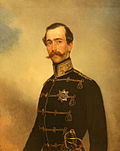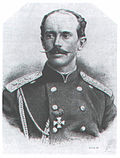
Duke of Leuchtenberg was a title created twice by the monarchs of Bavaria for their relatives. The first creation was awarded by Maximilian I, Elector of Bavaria to his son Maximilian Philipp Hieronymus, upon whose death without children the lands passed back to his nephew Elector Maximilian II. [1] It was re-created by Maximilian I Joseph, King of Bavaria on 14 November 1817 and awarded to his son-in-law, Eugène de Beauharnais, styled Royal Highness by personal grant, and with the style Serene Highness for his agnatic descendants. [2] [3] Eugène was the adopted stepson of the deposed Emperor Napoleon I of France, and had previously held the title of French prince (Prince français) with the style Imperial Highness. [4] He also had been the emperor's heir in Frankfurt and briefly in Italy. King Maximilian Joseph compensated his son-in-law after he lost his other titles and named him heir to the kingdom after the male-line descendants of the royal house and next in precedence after the Royal Family. [2]
Contents
- Duke of Leuchtenberg, 1650 to 1705
- Dukes of Leuchtenberg, 1817 to 1974
- Dukes of Leuchtenberg, morganatic branch (1890–present)
- Genealogy
- References
- Bibliography
The subsidiary title, also in the Bavarian peerage, was Prince of Eichstätt, but its attached territory was sold off by the 4th Duke to the King of Bavaria in 1855. [2] [5] On 14 July 1839, Emperor Nicholas I of Russia granted the Russian and Finnish style Imperial Highness, alongside the subsidiary title Prince Romanovsky, to the 3rd Duke, Maximilian, who had just married his daughter, Grand Duchess Maria Nikolaevna. [6] [7]
Nicholas Maximilianovich, 4th Duke of Leuchtenberg, was created Duke of Leuchtenberg in the Russian Empire in 1890 by Alexander III of Russia, as the ducal family was by then composed of members of the extended Russian Imperial Family. This creation once again confirmed the elevation of the style from Serene to Imperial Highness, and was to be carried by all male line descendants of Nicholas born of marriages of the corresponding rank, of the incumbent Duke from 1852 to 1891. The title was largely ceremonial, with no lands or governance attached; the style and title became "Duke von (or of) Leuchtenberg, de Beauharnais". [7]
Following the death of the 8th Duke in 1974, no remaining heirs of full dynastic status remained; the 8th Duke's parents' marriage was the last equal marriage entered into by a male dynast of the House of Beauharnais. The title is claimed by Nicolas de Leuchtenberg (born 1933), [8] senior heir of the 4th Duke by a morganatic marriage, whose grandfather Nicolas Nikolaievitch (1868–1928) was titled Duke of Leuchtenberg in 1890 by edict of Tsar Alexander III of Russia, with the style Highness. [7]










